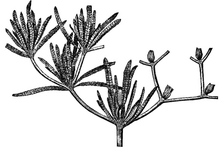Williamsoniaceae
Appearance
| Williamsoniaceae Temporal range:
| |
|---|---|

| |
| Restoration of Wielandiella | |

| |
| Diagram of Weltrichia, a male reproductive structure | |
| Scientific classification | |
| Kingdom: | Plantae |
| Clade: | Tracheophytes |
| Order: | †Bennettitales |
| Family: | †Williamsoniaceae (Carruthers) Nathorst, 1913 |
| Genera | |
| |
Williamsoniaceae is a family within the Bennettitales, an extinct group of seed plants. Members of this family are believed to have been around two meters tall and with widely serrate leaves along a central stem. Reproductive organs of the Williamsoniaceae have varied widely in the fossil record but almost all have been found to be borne on stalks emerging from a ring of leaves.[1]

Reproduction
[edit]This family is different from Cycadeoidaceae by having the presence of cones leaving the major axis and lateral branches associated with a long peduncle covered by bracts. Some of this family reproduce by sporangia and others only produce ovule or pollen sacs.[2]
References
[edit]- ^ Meyen, Sergei V. (1984). "Basic Features of Gymnosperm Systematics and Phylogeny as Evidenced by the Fossil Record". Botanical Review. 50 (1): 1–111. doi:10.1007/BF02874305. JSTOR 4354028. S2CID 38485693.
- ^ Paleontologia Paleovertebrados e Paleobotânica Autor : Ismar de Souza Carvalho. Editora Interciência. Archived 2016-03-04 at the Wayback Machine
